Intel Xeon E-2144G Benchmarks
For this exercise, we are using our legacy Linux-Bench scripts which help us see cross-platform “least common denominator” results we have been using for years as well as several results from our updated Linux-Bench2 scripts. At this point, our benchmarking sessions take days to run and we are generating well over a thousand data points. We are also running workloads for software companies that want to see how their software works on the latest hardware. As a result, this is a small sample of the data we are collecting and can share publicly. Our position is always that we are happy to provide some free data but we also have services to let companies run their own workloads in our lab, such as with our DemoEval service. What we do provide is an extremely controlled environment where we know every step is exactly the same and each run is done in a real-world data center, not a test bench.
We are going to show off a few results, and highlight a number of interesting data points in this article.
Python Linux 4.4.2 Kernel Compile Benchmark
This is one of the most requested benchmarks for STH over the past few years. The task was simple, we have a standard configuration file, the Linux 4.4.2 kernel from kernel.org, and make the standard auto-generated configuration utilizing every thread in the system. We are expressing results in terms of compiles per hour to make the results easier to read:
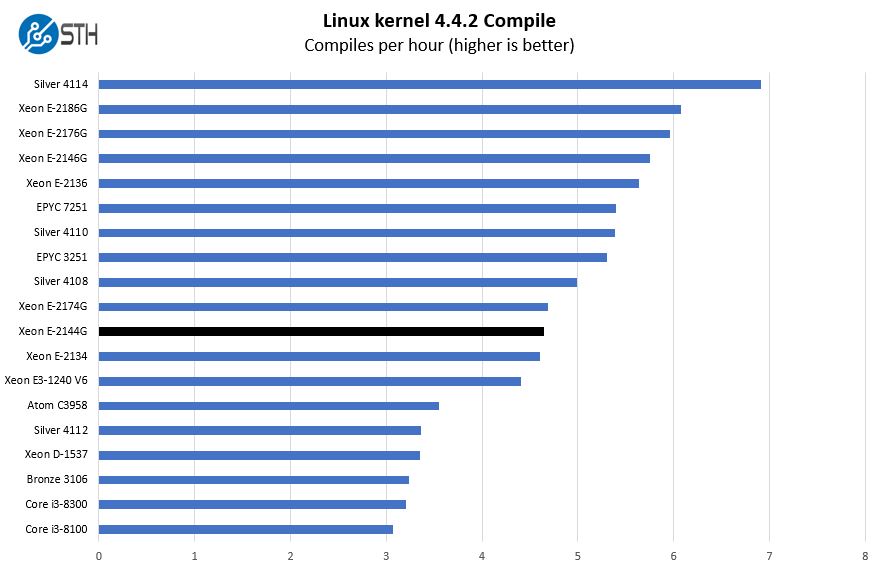
Here we see both small incremental performance of the Intel Xeon E-2144G and the Xeon E-2134 and Xeon E-2174G CPUs. Clock speeds are very similar and the chips have the same core count which means we expect very small differences between them.
c-ray 1.1 Performance
We have been using c-ray for our performance testing for years now. It is a ray tracing benchmark that is extremely popular to show differences in processors under multi-threaded workloads. We are going to use our 8K results which work well at this end of the performance spectrum.
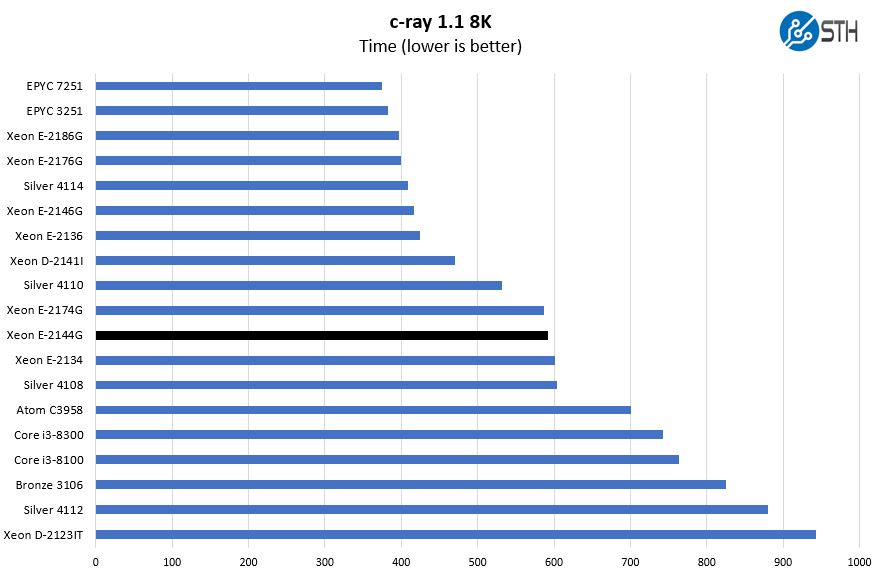
Here again, there is a relatively tight grouping of the 4 core/ 8 thread Intel Xeon E-2100 parts. We wanted to note here that the Intel Core i3-8100 and Core i3-8300 parts offer an intriguing value but without Turbo clocks and Hyper-Threading there is a wide gap in terms of performance.
7-zip Compression Performance
7-zip is a widely used compression/ decompression program that works cross-platform. We started using the program during our early days with Windows testing. It is now part of Linux-Bench.
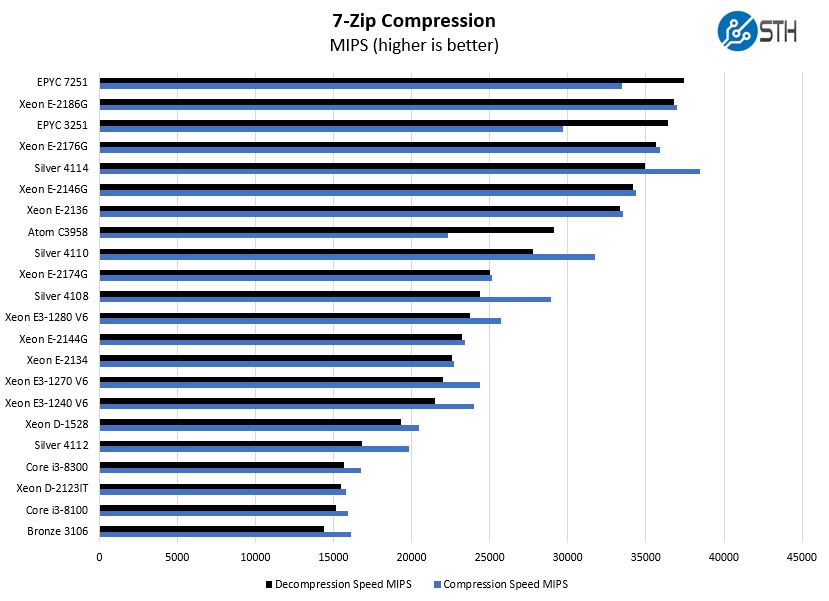
When it comes to the compression side, we actually see slightly more separation between the Intel Xeon E-2144G and the Intel Xeon E-2174G. Still, the 6 core/ 12 thread parts are much faster with a 50% core count advantage.
NAMD Performance
NAMD is a molecular modeling benchmark developed by the Theoretical and Computational Biophysics Group in the Beckman Institute for Advanced Science and Technology at the University of Illinois at Urbana-Champaign. More information on the benchmark can be found here. We are going to augment this with GROMACS in the next-generation Linux-Bench in the near future. With GROMACS we have been working hard to support Intel’s Skylake AVX-512 and AVX2 supporting AMD Zen architecture. Here are the comparison results for the legacy data set:
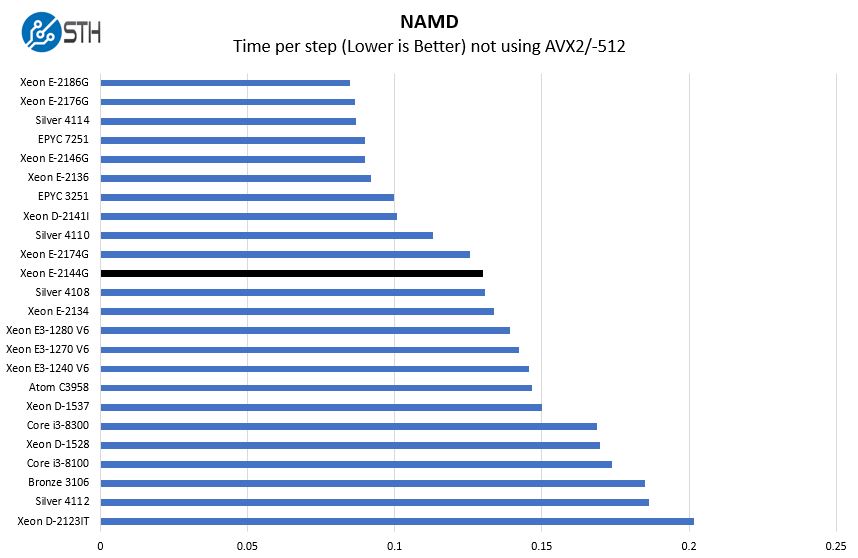
Here we see some solid gains in the 4 core/ 8 thread category with the Intel Xeon E-2144G providing a boost over the previous generation Intel Xeon E3-1280 V6.
Sysbench CPU test
Sysbench is another one of those widely used Linux benchmarks. We specifically are using the CPU test, not the OLTP test that we use for some storage testing.
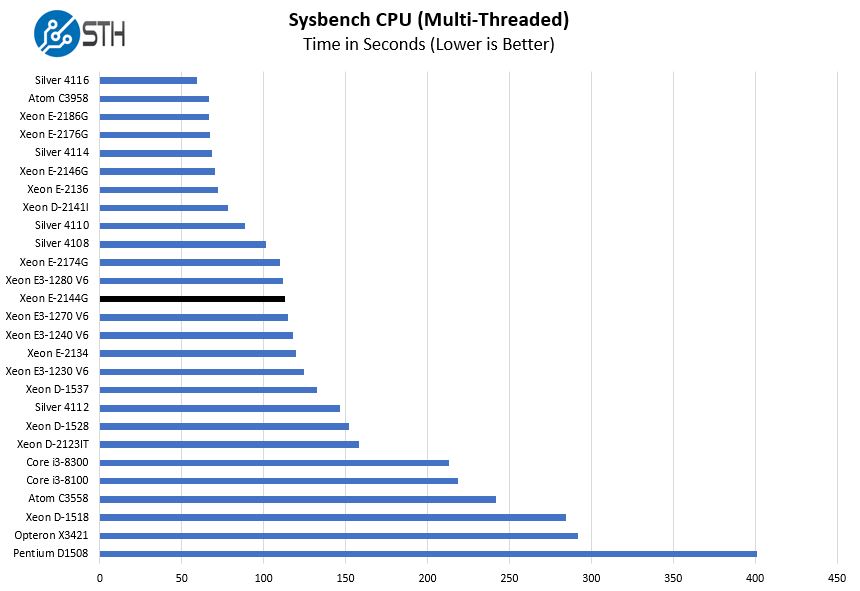
We have a broader range of CPUs shown here to give some perspective on the overall market. One can see that moving from the embedded 4-core solutions like the Intel Xeon D-2123IT and Xeon D-1518 to the Intel Xeon E-2144G provides a large bump in performance.
OpenSSL Performance
OpenSSL is widely used to secure communications between servers. This is an important protocol in many server stacks. We first look at our sign tests:
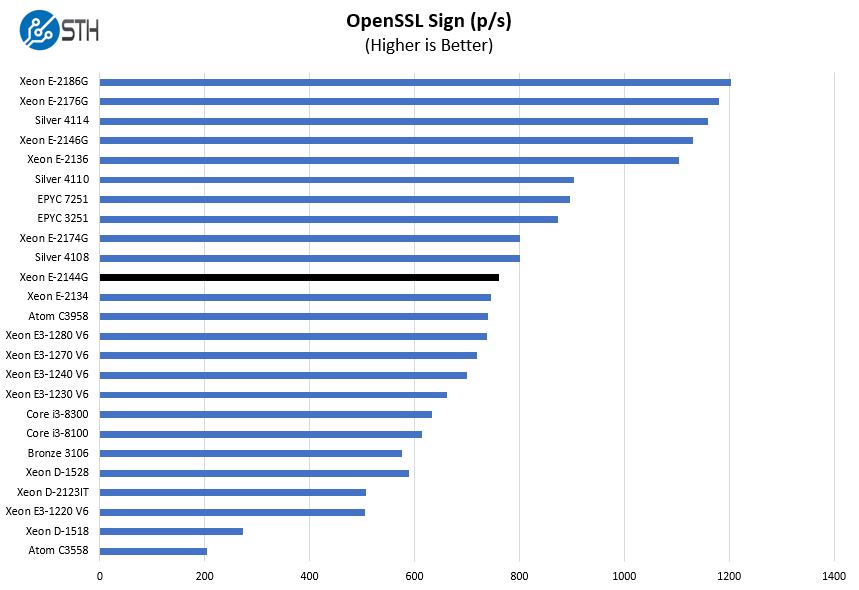
Here are the verify results:
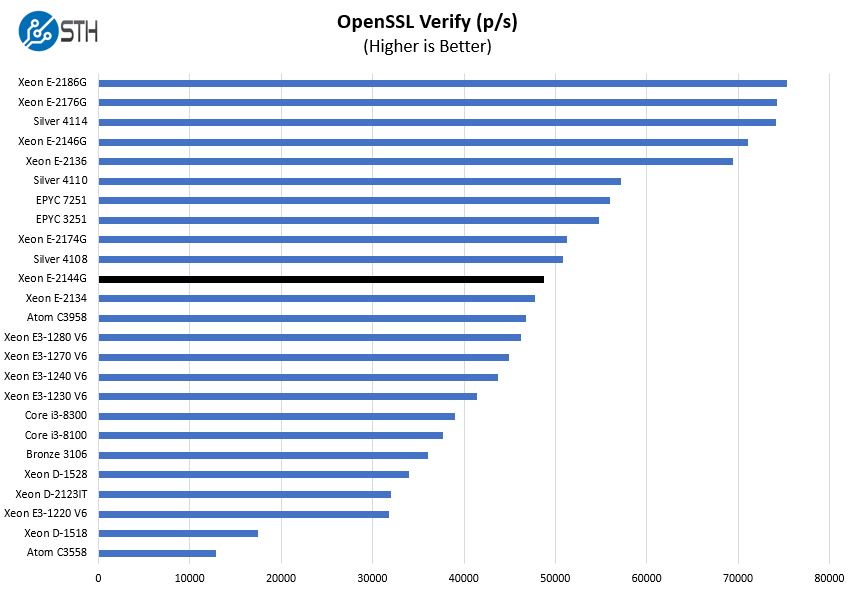
Here again, there is a very large delta between the previous generation parts and the new Intel Xeon E-2144G. The high clock speeds help, propelling the Xeon E-2144G beyond the 16 core Intel Atom C3958 and almost to the 8-core Intel Xeon Silver 4108 speeds.
UnixBench Dhrystone 2 and Whetstone Benchmarks
Some of the longest-running tests at STH are the venerable UnixBench 5.1.3 Dhrystone 2 and Whetstone results. They are certainly aging, however, we constantly get requests for them, and many angry notes when we leave them out. UnixBench is widely used so we are including it in this data set. Here are the Dhrystone 2 results:
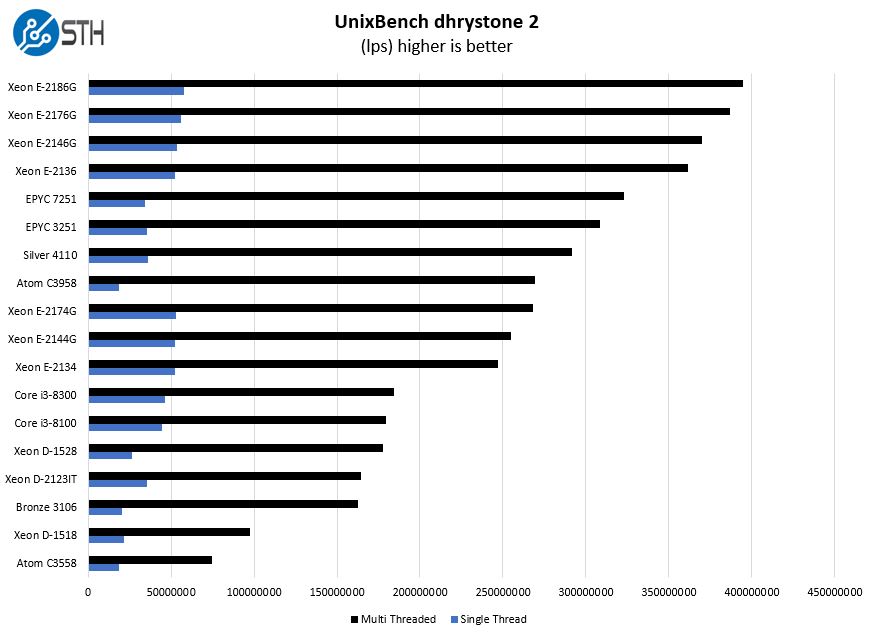
Here are the whetstone results:
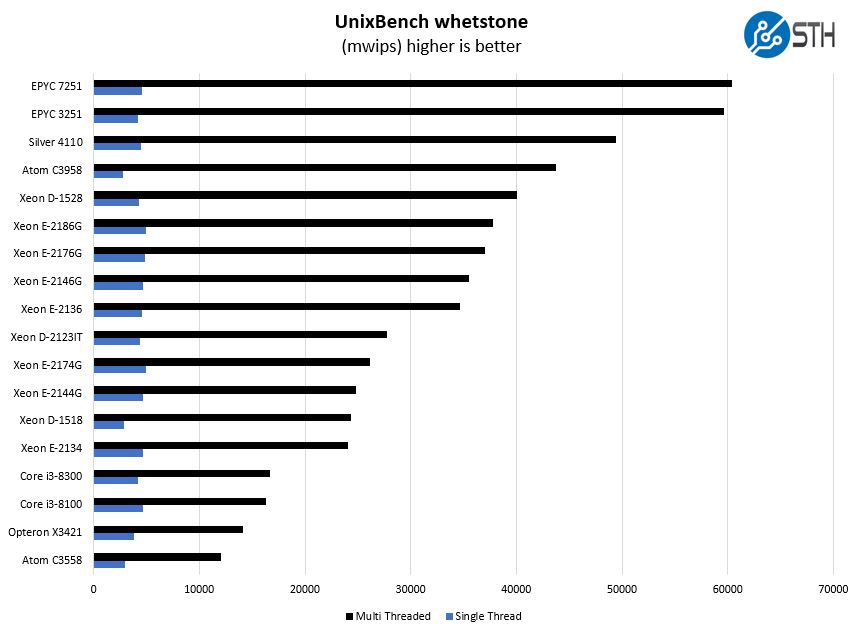
Again, in terms of the stack ranking, the Intel Xeon E-2146G is a relatively small cost upgrade in a system for a large performance upgrade over the Xeon E-2144G.
GROMACS STH Small AVX2/ AVX-512 Enabled
We have a small GROMACS molecule simulation we previewed in the first AMD EPYC 7601 Linux benchmarks piece. In Linux-Bench2 we are using a “small” test for single and dual socket capable machines. Our medium test is more appropriate for higher-end dual and quad socket machines. Our GROMACS test will use the AVX-512 and AVX2 extensions if available.
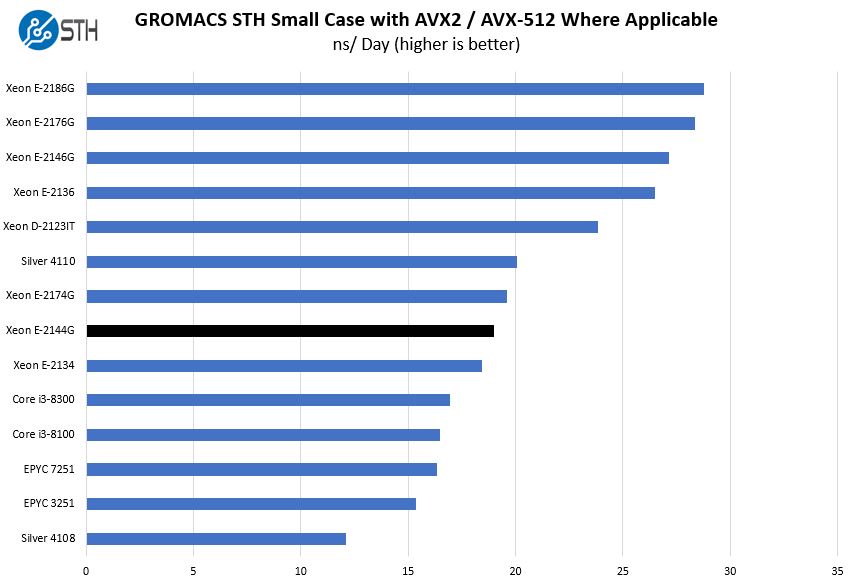
If you are using AVX-512, the Intel Xeon D-2123IT is a significantly faster part. We found in our review that the Intel Xeon D-2123IT performs like a dual AVX-512 enabled part, akin to high-end Intel Xeon Gold 6100 and Platinum 8100 parts.
Chess Benchmarking
Chess is an interesting use case since it has almost unlimited complexity. Over the years, we have received a number of requests to bring back chess benchmarking. We have been profiling systems and are ready to start sharing results:
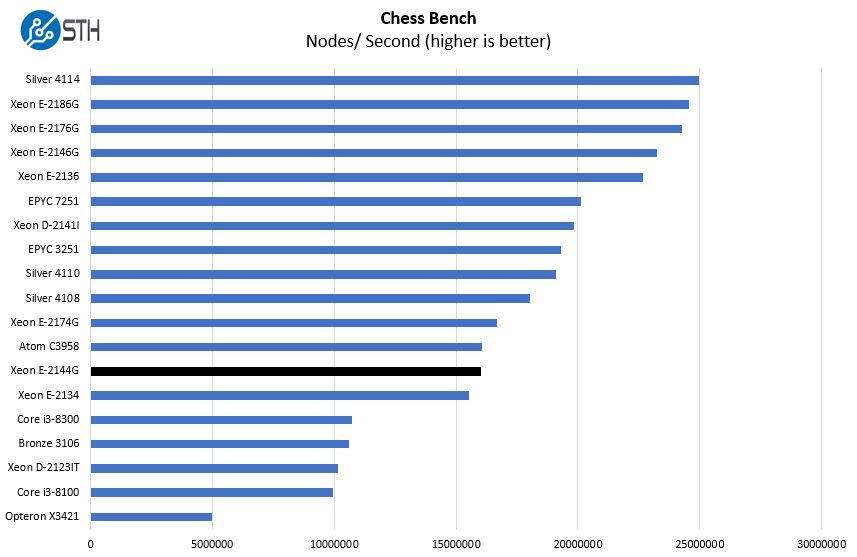
Here we see a fairly large impact of the higher clock speeds and hyper-threading compared to the Core i3 options one may put in a server that can support them.
Next, we are going to have power consumption, market positioning, and our final words.


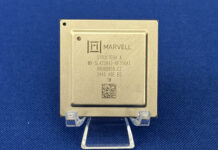

Yes, I’d love to use AMD Ryzen for some of our solutions – but as you say the lack of OOB management options makes it a difficult choice. Worried that the Tyan Tomcat EX S8015 is never going to make it to market – how long ago was that announced?! Especially when Intel has so many ongoing security issues with the parallelism of the out of order instructions etc. Moving up to Epyc doesn’t make sense for our SME marketplace.